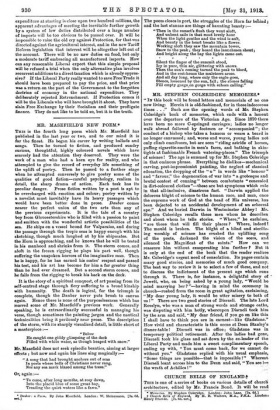MR. STEPHEN COLERIDGE'S MEMORIES.*
" II/ this book will be found letters and memorials of no one now living: Herein it is old-fashioned, for in these indecorous times . ." Such are the opening -words of Mr. Stephen Coleridge's book of memories, which ends with a lament over the departure of the Victorian Age. Since 1870 there have been no more C-springed carriages; ladies no longer walk abroad followed by footmen or "accompanied"; the conduct of a bishop who takes a hansom or wears a beard is no longer canvassed; and, worse and worse, young ladies not only climb omnibuses, but are seen " riding astride of horses, puffing cigarette-smoke in men's faces, and bathing in skin- tights at fashionable French watering-places." The triumph of science ! The age is summed up for Mr. Stephen Coleridge in that ominous phrase. Everything he dislikes—mechanical carving, post-impressionist painting, the neglect of classical education, the dropping of the " n " in words like " honour" and " favour," the degeneration of war into " a grotesque and brutal contest of cunning" between combatants "concealed in dirt-coloured clothes "—these are but symptoms which rule in that all-inclusive, disastrous fact. "Darwin applied the dolorous blight of science to the human race, and man, once the supreme work of God at the head of His universe, has been dejected to an accidental development of an arboreal ape." And we buried Darwin in Westminster Abbey ! Mr. Stephen Coleridge recalls these men whom he describes and about whom he tells stories. " Where," he exclaims, " are those that will fill their places ? Where, indeed! The mould is broken. The blight of a blind and steriliz- ing worship of science has crushed the uplifting song of the poets, darkened the vision of the seers, and silenced the Magnificat of the saints." How can we reassure him without exasperating him further P But it is only at the end of the book that the reader realizes Mr. Coleridge's urgent need of consolation. Its pages contain many good stories, and memories of much good company. The best way to review it is to select a few of these, and not to discuss the indictment of the present age which runs through it. There is, for instance, a delightful story of Jowett, who, on being asked by a young lady, "Would he mind marrying her ? "—having in mind the ceremony in church—rushed from the room in great agitation, exclaiming, " My dear young lady, it would be utter misery to both of us ! " There are two good stories of Disraeli. The late Lord Roselyn, who was a man of strong words and strange oaths, was disputing with him hotly, whereupon Disraeli took him by the arm and said, "My dear friend, if you go on like this I shall have to think you are in earnest—like Gladstone." How vivid and characteristic is this scene at Dean Stanley's dinner-table ! Disraeli was in office ; Gladstone was in temporary political retirement. After the ladies had gone, Disraeli took his glass and sat down by the ex-leader of the Liberal Party and made him a sweet complimentary speech, ending up with, " You must come back, for we cannot do without you." Gladstone replied with his usual emphasis, "Some things are possible—that is impossible!" Whereat Disraeli leant across him to the Dean and said, "You see !--. the wrath of Achilles !"


















































 Previous page
Previous page